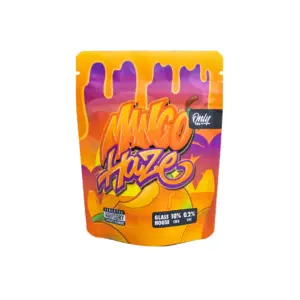Main differences in effects and properties
CBD and nicotine are two of the most popular compounds in existence. They have extremely different effects on the body, mind, and emotions.
Nicotine stimulates a person's central nervous system, leading to an increase in heart rate, blood pressure, and breathing rate. It also suppresses hunger cravings, which leads to weight gain for some people who smoke cigarettes or use other tobacco products such as pipes or cigars.
CBD does not stimulate the central nervous system at all and actually counteracts the effects of nicotine on the body. Many people widely use CBD as an alternative treatment for chronic pain relief without the side effects associated with prescription medications such as opiates or benzodiazepines.
What is CBD?
CBD is short for cannabidiol and is a non-psychoactive compound found in cannabis plants. It has been shown to have medical benefits without the high that THC can produce, making CBD perfect for those who need relief from physical pain but don't want to experience any type of euphoria or "high" as a result.
Effects and Properties of CBD:
CBD has many medicinal properties that can be beneficial to a person. CBD not only relieves pain, but also reduces anxiety and depression , improves sleep quality, combats psychosis disorders and much more.
It has been found to have very few adverse side effects or risks when taken in proper doses, which is another reason why so many people turn to this herbal supplement as an alternative treatment for chronic pain without any prescription drugs.
Additionally, CBD has a negligible effect on the mind and body, meaning it won't interfere with any kind of mental or physical performance.
What is nicotine?
Nicotine is a naturally occurring alkaloid that, when taken in high doses, can be highly addictive. It is an addictive stimulant drug made from the tobacco plant. It stimulates certain nicotinic acetylcholine receptors in brain tissue, increasing alertness and attention span, reducing hunger cravings (leading some smokers to use it as a diet aid), and providing a feeling of euphoria.
However, nicotine can cause many health risks, such as cancer or chronic obstructive pulmonary disease (COPD), when used for a long period.
Effects of nicotine:
Nicotine is a vasoconstrictor , which means it will narrow blood vessels and reduce blood flow to different parts of the body, including those involved in cognitive functioning, such as the hippocampus or prefrontal cortex.
This is why heavy users of nicotine consume it to experience feelings of dizziness or lightheadedness. When inhaled in large amounts, nicotine can cause nausea and vomiting, along with life-threatening respiratory problems such as bronchial constriction (a person's airways narrow) and an increased risk of asthma attacks due to inhalation.
Pregnancy effects include stillbirth/miscarriage, premature birth, and low birth weight, which lead to health risks later in childhood development and affect learning skills among prematurely born infants who are exposed during their mother's pregnancy.
Differences between CBD and nicotine:
There are quite a few differences between these two compounds. One difference is that while both have medicinal properties, they function differently within your body's endocannabinoid system: one is natural, and the other is synthetic.
Another important difference you'll notice is how long each type stays in your bloodstream before being broken down by liver enzymes; CBD typically doesn't stay in your bloodstream for very long, while nicotine can be present in your bloodstream for much longer.
CBD also lacks many of the addictive properties found in nicotine, such as addiction and withdrawal symptoms, so you'll have a harder time going through the emotional roller coaster when you quit using cannabis.
Another significant difference between these two compounds is how they affect neurotransmitter activity; while both increase the stimulation of dopamine receptors, one does so by binding to them, while the other works more indirectly by stimulating the production of endocannabinoids like anandamide, which increases the release of GABA (the "depressant" neurotransmitter).
There are so many options when it comes to quitting smoking. However, there's no one-size-fits-all answer to what will work best and be ideal in the long run because everyone is different.
When it comes to vaping CBD oil versus nicotine, some people prefer a more natural approach like CBD oil, which can even help you stay calm throughout the day with its output tone of voice, which can make things less stressful and easier on both the mind and body, providing soothing relief from any anxiety or stress without the side effects of other drugs.
Still, some people find this too expensive, while others don't want anything artificial at all.
CBD is an organic substance that may be healthier for the body than tobacco. The positive aspects of CBD are further compounded if it's a hemp product, with government regulators approving the compound's use.
This is essential for anyone who wants to avoid long-term addictions and make profound lifestyle changes, so don't hesitate to try these products today.
It's becoming increasingly clear that people are starting to learn about nicotine and CBD vaping products and find CBD a better option. After all, it has fewer side effects than nicotine while achieving the same high, or even a better one in some cases.
The last word
If you have to enter the debate about CBD vape juice vs. nicotine, keep in mind that CBD has been shown to be a much safer alternative for people than nicotine, but both have their challenges.
Most states still classify CBD as a controlled substance, and as such, it cannot simply cross state lines like an airplane without some sort of authorization from law enforcement or legislators.
This means that when you search for different vendors online, there may not be information about which dispensaries are available in your area.
























